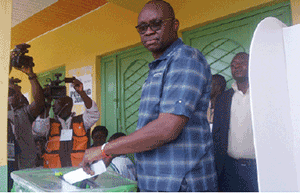VICTOR EBIMOMI is the Head, News Desk of TheNiche. He reflects on the just concluded governorship election in Ekiti State, highlighting factors that worked for Ayo Fayose in the contest
Fayose casting his vote
The June 21 governorship election in Ekiti State may serve as a turning point for the All Progressives Congress (APC), analysts have argued. The party was roundly beaten by the opposition Peoples Democratic Party (PDP) in the election. Before the election, bookmakers had almost given the victory to APC, given that the state had been under its control. The outcome, however, proved to the contrary. Dr. Kayode Fayemi, the governor during the election and APC candidate, polled 120,433 votes while the PDP flag bearer, Ayo Fayose, posted a whopping 203,090 votes.
Though his critics appeared to have earlier written him off, final result from the contest showed that Fayose seemed to understand the political terrain better. The moment he joined the race, his supporters believed that he was capable of re-defining the game. But essentially, the factors that worked for him were many.
Most prominent among them, according to investigations by TheNiche, is that unlike Fayemi who is perceived as being too elitist in his approach to governance, Fayose is regarded as a grassroots person who identifies with the people. This much was stated by some of the residents of Ekiti who spoke with our reporter a day before the election.
Felix Ogunyinde, who resides in Ado-Ekiti, said: “Fayose is a free person. When he was the governor, people enjoyed and he identified with us. But this government (of Fayemi) is not like that; it is for big men.”
He enthused that Fayose’s second coming would bring back the “the good old days”.
Joseph Yahaya corroborated his position, stressing that Fayose’s administration was better than that of Fayemi.
“When Fayose was in power, there was money and the common people enjoyed,” he said.
A woman who gave her name simply as Temitayo added that when Fayose was in power, her grocery was more flourishing than it was at the time of the report, claiming that Fayose was easily accessible to many people because he did not restrict himself to the fortified walls of the Government House.
Another factor that was seen to have worked for Fayose was his ability to zero in on some of Fayemi’s policy somersaults. For instance, the out-going governor never had a smooth sail with teachers and civil servants in the state. These, incidentally, are considered critical elements in Ekiti that is seen as a civil service state.
He got into trouble with them from the inception of his administration. The issue of promotion and payment of the new Teachers’ Salary Scale (TSS) set the administration on a collision course with the teachers. The governor was said to have told the teachers that he would not be able to pay the money due to paucity of funds. He, however, made a volte-face barely a month to the election. But while the issue lasted, Fayose lashed onto it, promising to pay the teachers a living wage when he becomes the governor. They bought into it.
There was also the issue of service reclassification. While it took place in the secondary schools and led to discontentment, primary school teachers, who saw the humiliation it caused to some teachers and the rancour it generated, refused to take the reclassification examination. Their refusal, they understood, could have far-reaching implication for them, if the governor got re-elected, hence they threw their support to Fayose. The PDP candidate was said to have promised them that if any of them was sacked, he would not only reinstate him or her but would pay the outstanding arrears.
Controversy over school fees at the state-owned Ekiti State University (EKSU) was also said to have been one of Fayemi’s undoing, which Fayose made a campaign issue. The fee was hiked astronomically to the extent that students became worried and never hid their concern. Fayose, on the other hand, was said to have promised to slash the fees to the level acceptable to the students if he eventually became governor, hence the students responded by mobilising the youths and their parents to vote for him.
Many also alleged that many of the governor’s aides did not help him in his second term bid. They were said to have shielded the governor from interest groups which could have been useful to him in the exercise. Our reporter learnt that Fayose exploited this vacuum, pledging a more inclusive administration. In keeping to this, he toured the state, wining and dining with different interests groups. The people were said to have bought into the agenda.
The Michael Opeyemi Bamidele (MOB) factor was also said to have played crucial role in the emergence of Fayose. Opeyemi, hitherto, a close friend of Fayemi, defected from the APC to Labour Party (LP) to contest the governorship election, on account of injustice that he was said to have received in APC. His exit was said to have gravely split the APC votes.
Equally, unlike Fayemi who is regarded as not having built a strong political structure of his own, Fayose, even outside the corridors of power, was said to have continued building a strong political structure everywhere he visited, capitalising on his grassroots disposition. While Fayemi only had ‘cells’ across the state, Fayose was reportedly on ground with enforcers and foot soldiers who always ensured that he was in touch with the ordinary people when it mattered most.
For instance, when President Goodluck Jonathan visited the state to present the party flag to Fayose, he was said to have reconciled different interest groups in favour of the PDP candidate, particularly among the traditional rulers, some of who Fayose was said to have offended during his first coming. They were said to have assured the president that they would support Fayose. On his part, Jonathan reportedly promised to attract federal government projects to the state through the governor-elect.













